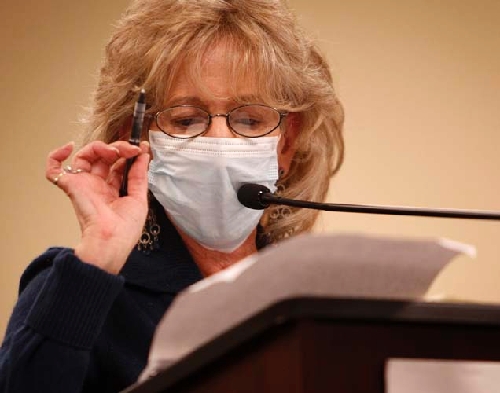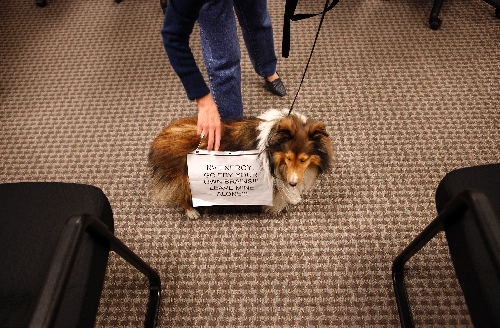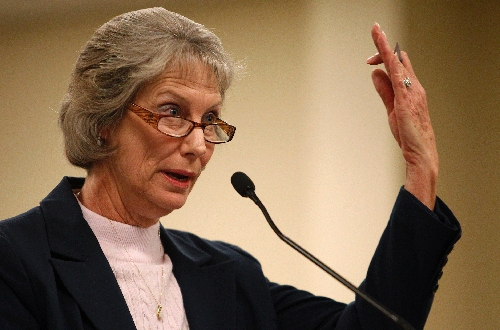Handful of consumers charged up over smart meters




NV Energize lit a spark under some electric ratepayers Tuesday.
NV Energy’s year-old smart-meter initiative was the topic of a workshop at the Las Vegas office of the Public Utilities Commission of Nevada, and the 30 or so consumers who attended had plenty to say about the devices. Some asked to opt out of the $300 million program, though that’s not allowed now.
NV Energy has installed around 600,000 of its 1.45 million digital meters, with more than 96 percent of customers reporting no problems. But 1,400 people asked to postpone installation out of concerns about health or privacy. The commission’s workshops are designed to give those concerned ratepayers another chance to weigh in on the meters.
Tuesday’s session focused on the meters’ safety, security and reliability, as well as customer-service issues.
NV Energy started the workshop by addressing what company officials called smart-meter myths: No, the utility can’t tell what appliances you’re using, executives said. Smart meters track only whole-house use.
Nor do the meters constantly emit radio frequencies. They transmit three to five seconds a day, and only when they send use details to NV Energy.
Plus, those signals are too weak to cause health problems, NV Energy officials said. Standing outside, one foot in front of a smart meter, exposes a person to 1/15,000th of the radio-frequency limits allowed by the Federal Communications Commission. Standing near a meter inside exposes a person to 1/450,000th of limits the FCC considers safe.
NV Energy executives also pointed to international studies looking at whether radio-frequency from cellphones, which have more powerful signals than smart meters, could cause headaches, insomnia or other effects. The studies found no evidence of a relationship. Other analysis has shown that people who blame side effects on radio-frequency exposure also experience those symptoms when signals are absent.
But the 30 or so consumers on hand to comment weren’t hearing any of it. They noted other research showing health fallouts of electromagnetic waves from cellular phones. They also lamented what they fear will be a loss of privacy because of the meters.
Carol Feinberg, a ratepayer who testified from Carson City, said she and other smart-meter opponents could point to more than 40 studies showing negative health effects from radio-frequency exposure, including immune suppression, slow memory and leukemia.
“Many of us are seniors. Our immune systems are already weakened and compromised,” Feinberg said. “We can’t afford additional threats to our health.”
What’s more, anyone with a “reasonably competent understanding of technology” could hack into power-use records and determine when a consumer is home or away, Feinberg said.
“This is Big Brother watching us big-time, all the time,” she said. “This is not the America I want for my husband, myself, my children or my grandchildren.”
Feinberg said she’d like the commission to offer an opt-out rule for ratepayers who don’t want smart meters.
Las Vegan Joyce Hazard echoed privacy concerns. Hazard said her privacy was compromised after someone stole a computer from her insurance company.
“It can happen anywhere. I don’t care what kinds of things they have in place for that,” Hazard said.
Commission staff members also questioned NV Energy, mostly regarding privacy assurances and efforts to inform ratepayers about the installation process.
Hearing officer Nancy Wenzel said too many consumers don’t know about NV Energize until they get a placard notifying them of a pending switch. She said the utility needs to do a better job of telling ratepayers about the meter changes.
The commission has scheduled another workshop for Jan. 18. Consumers can submit comments for that session, which will cover whether ratepayers should be able to opt out of smart-meter installation. Consumers must file written testimony before the workshop if they want to participate.
The commission approved the meter rollout in 2010 after hearings into NV Energize, which NV Energy said will let the company run voluntary peak-pricing programs and save $35 million a year in operating costs on expenses including meter readers and service trucks. The commission studied evidence on customer-privacy and cybersecurity measures, as well as radio-frequency output, costs and budget risks.
The commission has a Web page with information about smart meters. Visit puc.nv.gov and click on the “Smart Meters” option in the menu on the left.
To submit comments for the workshop, deliver a written statement in person or via mail to the commission, at 9075 W. Diablo Drive, Suite 250. Consumers can also file statements electronically by going to the commission’s website, clicking on “Administration” and choosing the “Electronic Filing System” option.
Contact reporter Jennifer Robison at
jrobison@reviewjournal.com or 702-380-4512.












